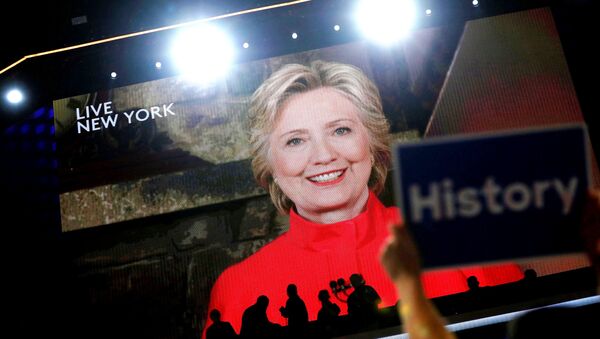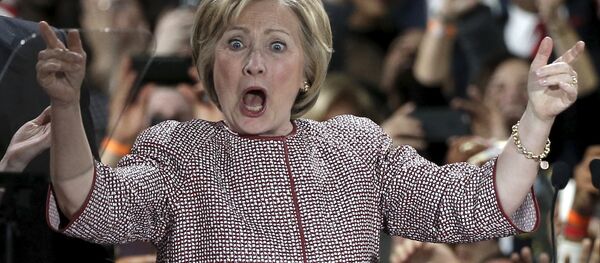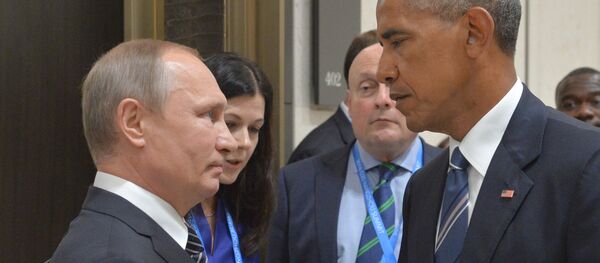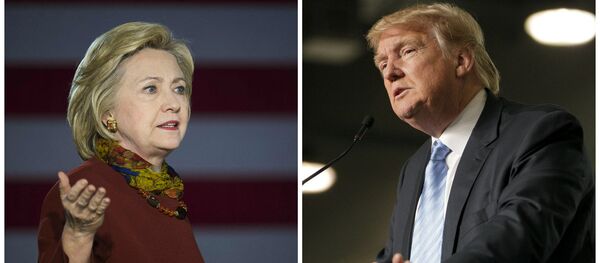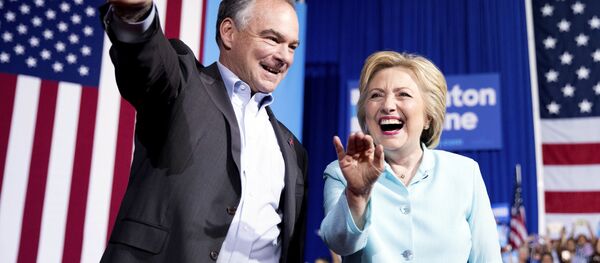On Monday, The Washington Post reported that US intelligence and law enforcement agencies are now seriously "investigating what they see as a broad, covert Russian operation in the United States to sow public distrust in the upcoming presidential election and in US political institutions."
The effort, the newspaper noted, is being coordinated by director of national intelligence James Clapper.
At the same time, while a senior unnamed official admitted to the paper that the intelligence community has absolutely no "definitive proof" of Russian intentions to tamper with US elections, he added that "even the hint of something impacting the security of our election system would be of significant concern. It's the key to our democracy that people have confidence in the election system."
Talk of Russian interference in the US presidential race began earlier this summer. In July, US officials accused Russian hackers affiliated with the government of hacking the Democratic National Committee, resulting in leaks that showed Democratic Party collusion with Hillary Clinton against anti-establishment candidate Bernie Sanders. The scandal, which exploded after WikiLeaks published DNC emails, quickly led to Clinton supporters accusing Russia, the Kremlin and President Putin of personally coordinating an anti-Clinton information war. Nevertheless, US officials are in no hurry to publically accuse Russia, or to provide any actual evidence of Russian involvement.
Nevertheless, Washington's official silence has prompted politicians from both parties to demand that President Obama 'take the Russians to task'. Moscow's motive all along, they've claimed, has been the desire to discredit US global leadership.
Russian officials have consistently denied any interference in the US electoral process, emphasizing that the Kremlin is ready to work with any American administration. Putin, for his part, candidly told Bloomberg recently that "in order to influence the course of the US elections, it's necessary to have your finger on the pulse, and to get the specifics of domestic political life in the US. I'm not sure that even our foreign ministry experts are sensitive enough to it."
Nevertheless, accusations against Russia have not stopped. For their part, Russian political analysts, stunned by the barrage of unsubstantiated claims directed against Moscow, suggested that the tone of the rhetoric, which seems to be growing more and more menacing with each passing day, has become very reminiscent of the atmosphere which was prevalent during the darkest days of the Cold War, when sinister Russian influence in the form of the 'red menace' was seen in every facet of American life.
Commenting on The Washington Post article's claims, Fedor Lukyanov, editor of the Russia in Global Affairs magazine, told Sputnik that the accusations were "very strange," to say the least.
"But in The Washington Post's latest piece, it's all just completely incomprehensible. It's not even clear exactly what they were trying to say. The article just talks about a large-scale Russian plot to spread distrust in American democracy and the success of US policy among Americans. However, the journalists did not tell readers how exactly this could actually be achieved."
Ultimately, Lukyanov noted, "the entire article creates a very sad impression of a series of conspiracy theories strung together. Usually this sort of thing happens when one feels insecure." The analyst recalled that this feeling was once very common in post-Soviet Russia, where everything was blamed 'on the Americans'. Now, he added, the same thing seems to be happening in the US.
'The Masses vs. the Establishment'
More importantly, Lukyanov emphasized that today, more than at any other time in recent memory, a strong tension has emerged between the establishment – the US political class, and society in general. "This gap is immense, continues to grow, and is felt and seen by absolutely everyone. This was shown by the primary results of both parties," where non-establishment candidates either won or came close to winning their respective party's nomination.
Accordingly, the analyst noted, "it can be assumed that this tendency resulted in significant confusion and even bewilderment among America's political class, to the point where the establishment simply does not know how to behave and what to do next."
Therefore, Lukyanov suggested that he could not rule out "that these unsubstantiated accusations against Russia…really serve as a reaction to the confusion the political class is feeling in the present situation. Such a thing has not happened in the US for a very long time. It's true that the country faced hard times during and after the Vietnam War. But a picture of a America that can be politically vulnerable is something I for one cannot recall."
For his part, Gevorg Mirzayan, a political observer for the Russian business magazine Expert, recalled that far from seeking to intervene in the US election process, Moscow has been walking on eggshells to try to avoid any commentary that might be seen as interference. Speaking to Svobodnaya Pressa, Mirzayan pointed out that any explicit attempt by the Kremlin to influence US elections in favor of one candidate would have precisely the opposite effect.
"If, let's say, North Korean leader Kim Jong-un were to endorse Trump, this would undoubtedly swing voters in the direction of Hillary Clinton," the analyst noted. "This is the reason President Putin and Foreign Minister Sergei Lavrov have been so cautious when speaking about Trump, even if he is much more interesting for Russia than Clinton. Russian leaders know perfectly well that their words are subject to interpretation abroad."
"For now," the analyst noted, "many more Americans are talking about Trump's 'radicalism', Clinton's controversial image, and how it is that America actually got these people as their candidates."
The 'Russian Trace' as Distraction to Vote Rigging in November?
Sergei Ermakov, an expert at the Moscow-based Russian Institute for Strategic Studies, told Svobodnaya Pressa that something much more sinister could be underfoot.
"Elections," he recalled, "are not only a key instrument for the legitimation of a political system, but an expression of elite consensus. In the United States today, such consensus is in doubt."
Therefore, the expert warned that the unprecedented rise of anti-establishment sentiments, concentrated in the Trump campaign but also prevalent in Bernie Sanders' effort to unseat Hillary Clinton during the primaries, may lead America's political and media elite to conclude that it is necessary to engage in serious manipulation, up to and including electoral manipulation, to ensure the victory of their favored candidate in November.
"And what's really troubling is that these preparations are being made well ahead of time. In my opinion, this suggests that a comprehensive system of measures for manipulation is being prepared to ensure that the results of the elections have the 'correct' outcome. Otherwise, the results may not be in favor of the Democratic Party's candidate."
As for the claims that the Kremlin is engaged in efforts to manipulate America's election, Ermakov noted that the reality is that Moscow has very few tools at its disposal to be able to influence or inform the views of ordinary voters. Foreign-language Russian media, for example, may have some resonance, but it won't affect the views of the majority of ordinary people, who get their news from major US networks and newspapers.
"And the situation with non-government organization similar. Russian laws [limiting] the activities of foreign NGOs was adopted relatively recently, but in the US such a law has been in force for decades. As a result, the US has developed a very efficient system for monitoring foreign NGOs, including those engaged in humanitarian activities and elections. In other words, this channel to influence the American voter is not available to us."
Effectively, Ermakov suggested, "neither Russia nor any other country is capable of significantly affecting the electoral process in the USA. This requires not only time and considerable resources, but also – and more importantly, serious ideological groundwork enabling outsiders to influence public opinion. The current Russian messaging tools, aimed at protecting our national interests, are not even close to having this groundwork."
Ultimately, the analyst argued that the political scandal involving Russia only serves to hide the actual efforts at electoral manipulation being engaged in by America's own political and media establishment.

